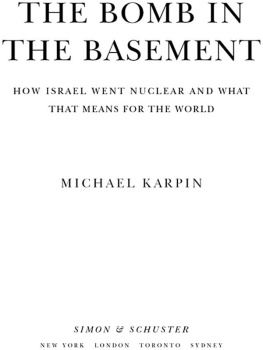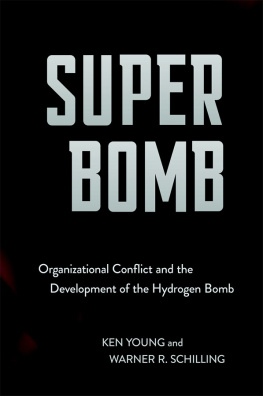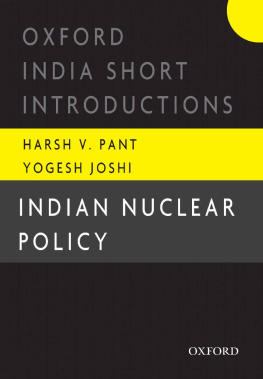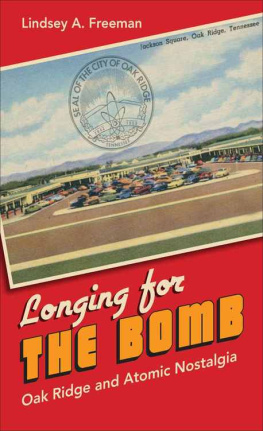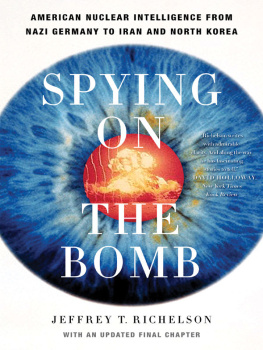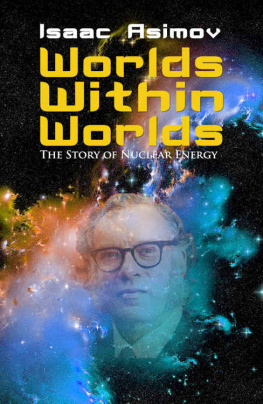Cover
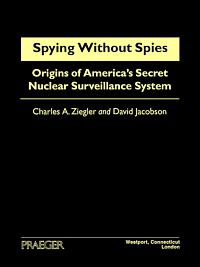
| title | : | Spying Without Spies : Origins of America's Secret Nuclear Surveillance System |
| author | : | Ziegler, Charles A.; Jacobson, David. |
| publisher | : | Greenwood Publishing Group |
| isbn10 | asin | : | 0275950492 |
| print isbn13 | : | 9780275950491 |
| ebook isbn13 | : | 9780313047800 |
| language | : | English |
| subject | Nuclear weapons--Testing--Detection--History, Military surveillance--United States--History, Intelligence operations--History , United States |
| publication date | : | 1995 |
| lcc | : | U264.3.Z54 1995eb |
| ddc | : | 355.02/17 |
| subject | : | Nuclear weapons--Testing--Detection--History, Military surveillance--United States--History, Intelligence operations--History , United States |
Page i
Spying Without Spies
Page ii
This page intentionally left blank.
Page iii
Spying Without Spies
Origins of Americas Secret Nuclear Surveillance System
Charles A.Ziegler and David Jacobson

Page iv
Library of Congress Cataloging-in-Publication Data
Ziegler, Charles A.
Spying without spies: origins of Americas secret
nuclear surveillance system/Charles A.Ziegler and David Jacobson.
p. cm.
Includes bibliographical references and index.
ISBN 0-275-95049-2 (alk. paper)
1. Nuclear weaponsTestingDetectionHistory. 2. Military
surveillanceUnited StatesHistory. I. Jacobson, David.
II. Title.
U264.3.Z54 1995
355.021774744dc20 9433263
British Library Cataloguing in Publication Data is available.
Copyright 1995 by Charles A.Ziegler and David Jacobson
All rights reserved. No portion of this book may be
reproduced, by any process or technique, without the
express written consent of the publisher.
Library of Congress Catalog Card Number: 9433263
ISBN: 0-275-95049-2
First published in 1995
Praeger Publishers, 88 Post Road West, Westport, CT 06881
An imprint of Greenwood Publishing Group, Inc.
Printed in the United States of America

The paper used in this book complies with the
Permanent Paper Standard issued by the National
Information Standards Organization (Z39.481984).
10 9 8 7 6 5 4 3
Page v
CONTENTS
Preface | vii |
Introduction | ix |
Chapter 1 | World War II Origins of Radiological Surveillance | |
Chapter 2 | Postwar Hindrances to Rapid Development | |
Chapter 3 | Technical Progress: 19451946 | |
Chapter 4 | The Organizational Dust Settles | |
Chapter 5 | Birth of the Monitoring Organization | |
Chapter 6 | Technical Progress: 19461947 | |
Chapter 7 | Sandstone and Fitzwilliam | |
Chapter 8 | Pressures to Become Operational | |
Chapter 9 | Vested Interests and Committee Politics | |
Chapter 10 | Building Alliances and the Interim Net | |
Chapter 11 | The Detection of Joe-1 and Beyond | |
Bibliography | |
Index | |
Page vi
This page intentionally left blank.
Page vii
PREFACE
This book is based on research that was supported by the National Endowment for the Humanities (Grant RH-2089389). We wish to thank Lloyd R. Zumwalt, Robert P.Multhauf, and Stanley Goldberg for their help and collaboration in carrying out this research. Our major sources were unpublished documents in the archives of various government agencies, published articles and books, and informant interviews. The government documents we cite are in collections at the National Archives (NA), the Herbert Hoover (HHPL) and Harry Truman (HTPL) Presidential Libraries, the Library of Congress (LC), the archives of the Los Alamos National Laboratory (LANL), the Air Force Historical Research Center (AFHRC), the Air Force Phillips Laboratory (AFPL), and the Air Force Geophysical Laboratory (AFGL). Additional documents were obtained through the Freedom of Information Act from the Departments of Defense (DOD) and of Energy (DOE) and the Central Intelligence Agency (CIA).
We would be remiss if we failed to point out that our appeals under the Freedom of Information Act for certain documents (which we could identify with precision) were rejected by the relevant government agencies. We believe that these documents contain still-classified diplomatic information that is (fortunately) peripheral to the scientific and organizational themes we have attempted to enlarge upon in this book. One such top secret document, however, will be especially useful to later historians interested in this topic. The following information will aid in its retrieval at some future date when the government decides that its contents can at last be revealed: History of Long Range Detection, 19471953, by Doyle Northrup and Donald Rock, Call No. TS-HOA-79 L6, 330 pages, Archives, Air Force Technical Applications Center.
Although archival materials constitute the primary evidence on which this book is based, we also obtained supplementary information from
Page viii
twenty-five informants who participated in the events described and whom we interviewed as part of our research. They gave freely of their time, their memories, and, in some cases, the relevant documents and memoirs in their possession. We gratefully extend our thanks to Dana Atchley, Robert F. Bacher, William E.Barbour, Jay L.Beaufait, Ralph D.Bennett, Edward A. Doty, Herbert Friedman, William T.Golden, Frederick C.Henriques, Paul A.Humphrey, Jerome Kohl, Arnold Kramish, Gerard M.Leies, Leon Leventhal, Luther B.Lockhart, Wilfred B.Mann, Charles B.Moore, Wendell C. Peacock, Roger R.Revelle, Walter Singlevich, Roderick W.Spence, Athelstan F.Spilhaus, Julius Tabin, Albert C.Trakowski, and Lloyd R.Zumwalt.
We thank Mildred Crary and Sybil Northrup for providing us with material on their husbands role in creating the nuclear surveillance system. We also thank Robert G.Todd for his documentation on Mogul and Alan Stockdale for his review of relevant social studies of science and technology. We are greatly indebted to Alan Needell and Paul Forman for commenting on the manuscript and to Gerard Leies, Roderick Spence, and Lloyd Zumwalt for their advice in assessing the significance of highly technical government documents, but we assume full responsibility for the interpretations that are presented here. Last but not least, we thank Virginia Ziegler and Lois Jacobson, who kindly accepted our occasional preoccupation with the research and writing of this book.
Next page

